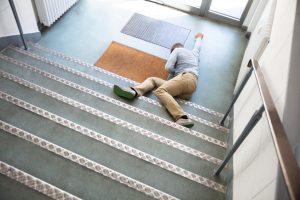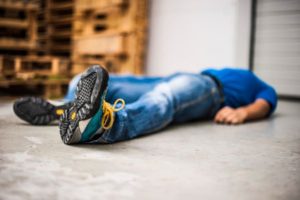By Richie Billing. Last Updated 18th March 2024. In this guide, we’ll look at the average payout for a slip and fall in the UK. Many of us may slip, trip or fall at some point. In many cases, these kinds of accidents might not cause any significant repercussions.
However, slip and falls, like any other accident, can also cause serious injury. You may be left unable to work or do the thing you’re usually able to do. If your injuries were caused by the negligence of someone who owed you a duty of care, you may be able to claim.
After getting hurt, you may wonder, “What is the average payout for a slip and fall in the UK?”. If this is the case, we can help. For free advice, you can:
- Call 0800 408 7825
- Use the live chat function at the bottom right of this page, or
- Contact us directly
Otherwise, read on for more information on slips, trips, and falls.

Select A Section
- The Average Payout For A Slip And Fall In The UK
- Can I Claim Compensation For A Slip And Fall?
- Tips on Proving Slip and Fall Claims
- No Win No Fee Slip And Fall Solicitors
- Learn More About Average Payout For A Slip And Fall In The UK
The Average Payout For A Slip And Fall In The UK
You may want to know more about what the average payout is for a slip and fall. However, it’s impossible to provide an average compensation amount as every claim is different. As previously mentioned, general damages compensation relates to aspects such as the severity of the injury and to what degree the injury has negatively impacted your life.
When calculating general damages compensation for a slip and fall claim, legal professionals can refer to the Judicial College Guidelines (JCG) for greater insight into your potential compensation figure.
These figures are taken from the latest guidelines, that were published in 2022. Please remember that they only relate to successful claims that have taken place in England and Wales. Furthermore, these figures are not guarantees and should be viewed as a guide only. Also note that the first entry in this table is an estimated figure that is not based on the JCG.
| Type of injury | Compensation amount | Notes |
|---|---|---|
| Multiple serious injuries plus special damages | Up to £750,000+ | If you’ve suffered numerous serious injuries from a slip and fall, then you may be compensated for all of these plus related special damages, such as loss of earnings. |
| Brain damage – Very Severe (a) | £282,010 to £403,990 | The injured person will have little or no meaningful response to their environment, double incontinence and a need for full-time care. |
| Brain damage – Moderately severe (b) | £219,070 to £282,010 | This bracket applies to brain injuries which leave the victim very seriously disabled. There will be substantial dependence on others. Constant professional care will be required for the injured party. |
| Brain damage – Moderate (i) | £150,110 to £219,070 | Intellect will have been affected to a moderate to severe degree. |
| Back injury – Severe (a) (i) | £91,090 to £160,980 | This bracket may cover serious injuries such as damage to the spinal cord and nerve roots. The victim will be suffering from severe pain and disability. |
| Back injury – Moderate (b) (i) | £27,760 to £38,780 | Examples of injuries that might fall under this bracket include compression/crush fractures with pain and discomfort. |
| Neck injury- Severe (ii) | £65,740 to £130,930 | Injuries such as serious fractures or damage to discs in the spine. The disabilities will fall short of more serious injuries; however, they will give rise to considerably severe injuries. |
| Psychiatric damage – Moderately Severe (b) | £19,070 to £54,830 | Where the injured person has significant problems with life, education and work. The prognosis will be more optimistic than in more serious cases. |
| Elbow Injury – Moderate or minor (c) | Up to £12,590 | This bracket includes simple fractures. |
Special Damages
Every successful personal injury claim will include general damages – this is an amount of compensation for the injury itself and how much pain and suffering it may have caused you.
Special damages may not be included in every claim – this is an amount of compensation a person may seek for financial losses caused by an injury. This can include:
- Travel costs to therapy
- Lost wages
- Loss of future income
- Home adjustments
- Medical expenses
For example, if you had an accident involving a slip and fall at a school, and it could be proven your resulting injury was caused by the school’s negligence, your claim could include compensation for damaged property or travel costs if you were then unable to drive.
If you would like a valuation of your claim, please reach out to one of our advisers to discuss the slip and fall claims process and compensation.
However, we can provide you with a more accurate estimate that relates to your specific injury if you get in touch. If you have further queries about making a slip and fall claim, please contact us for free using the above details.
Can I Claim Compensation For A Slip And Fall?
Now that you’ve learned about the average payout for a slip and fall, you might be wondering when you could claim. Unfortunately, not all cases of a slip and fall will result in a valid claim. This is because, in order to claim, you must be able to prove that:
- You were owed a duty of care.
- This duty of care was breached.
- As a result, you were injured.
A duty of care is a legal responsibility for someone else’s health and safety. For example, when you are in the workplace, your employer owes you a duty of care. This means that they must take all reasonably practicable steps to keep you safe while you are working, as outlined by the Health and Safety at Work etc. Act 1974 (HASAWA). If employers fail to fulfil this duty, and their employees are injured as a result, this may result in successful claims for slip and fall compensation amounts.
Similarly, you are owed a duty of care when you are visiting a public place. In this case, the controller of the space must take steps to ensure the reasonable safety of visitors, as per the Occupiers’ Liability Act 1957 (OLA). The controller of a space may be an individual or an organisation such as your local council.
Our advisors can help if you would like to find out if you can claim compensation for a fall. When you get in touch, they can offer a free evaluation of your claim, and if it’s valid, they may connect you with a solicitor from our panel. Contact us today to get started and learn more about matters related to slip, trip and fall accident claims such as the average workplace trip compensation payout.
How Much Time Do I Have To Make A Slip And Fall Claim?
If you are eligible to seek slip and fall compensation for your injuries, it is vital that you start the claiming compensation process before the personal injury claims time limit expires. The Limitation Act 1980 generally gives the claimant 3 years from the date of the accident to start a claim.
However, in some circumstances, there are exceptions to the time limit. These include:
- Those who lack the mental capacity to bring forward their own claim. These parties have the limitation period suspended for as long as they are unable to initiate legal proceedings themselves. During this time, a court-appointed litigation friend can act on their behalf. However, should the injured party regain this mental capacity, they will have 3 years to pursue a claim from the date of recovery if one was not made for them already.
- Those under the age of 18. These parties have a pause applied to the time limit that lasts until their 18th birthday. Prior to this date, a litigation friend can bring forward a claim on their behalf. Once they reach their 18th birthday, they will have 3 years to begin the claiming compensation process if a litigation friend did not already do so.
If you have any questions about slip and fall compensation amounts or the limitation period, please contact an advisor. Additionally, they can calculate how much compensation for a fall in the UK you might be able to claim.
Tips On Proving Slip and Fall Claims
Now that you know how much you could get in compensation for a fall in the UK, you might be wondering what steps you can take to support your claim.
When you make a personal injury claim, it’s your responsibility to prove that negligence occurred. Some examples of evidence you could collect to support your case include:
- CCTV footage: You may be able to request footage of the accident to help show how it occurred.
- Photographs: Photographs of either your injuries or of the accident site can be useful to show how the accident occurred and how severely it has affected you.
- Medical records: Your medical records can provide more insight into your injuries, including how severe they are, what treatment you need, and how they will affect you in the future.
- Witness statements: Taking down the contact details of anyone who witnessed the accident means that their statements can be taken by a professional later.
One of the benefits of working with a solicitor on your claim is that they can help you gather evidence. For example, a solicitor can request CCTV footage on your behalf, and speak to witnesses.
To find out if a solicitor from our panel could help you, contact our team of friendly advisors today. Or, read on to learn more about the benefits of working with a solicitor.
No Win No Fee Slip And Fall Solicitors
Now that you’ve learned about slip and fall compensation amounts, we want to let you know about the benefits of a No Win No Fee arrangement. Our panel of personal injury solicitors offer their services on under a Conditional Fee Agreement (CFA), which is a kind of No Win No Fee agreement.
Under a CFA, you do not need to pay any ongoing or upfront fees to your solicitor for them to start work on your slip and fall claim. Similarly, if your personal injury claim fails, then you will not need to pay a fee to your solicitor for their work.
If you are interested in instructing a No Win No Fee solicitor from our panel, or you have questions about the average payout for a slip and fall in the UK, our advisors can help you. Our services are available to use 24/7, so get in touch with us whenever is best for you.
Below are just some of the ways you can reach us:
- Call for free on 0800 408 7825
- Request a call back using our contact form
- Connect to our team of online advisors using our live chat feature
Learn More About The Average Payout For A Slip And Fall In The UK
Check out more of our articles on average compensation claim payouts.
- Do I get paid if I am injured at work?
- Public Accident Personal Injury Guide
- Accidents While Shopping Personal Injury Claims Guide
- Statutory Sick Pay
- Royal Society for the Prevention of Accidents: Guidance on Slips and Falls.
- HSE Guidance on Preventing Slips and Falls
- How Much Compensation For A Fall In The UK?
We also have some other guides on personal injury claims you may find useful:
- Public accident claims hot spots
- Council slip and trip accidents
- Child Accident In Public Place Compensation Claim Guide
- How to claim against the local council
- Potential values of slip trip accident compensation claims
- Can you claim for a fall at work?
Thank you for reading our guide on the average payout for a slip and fall in the UK.


